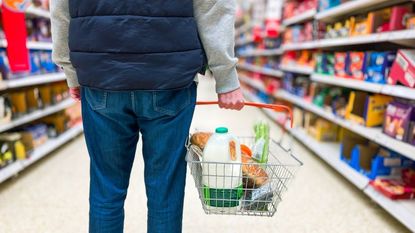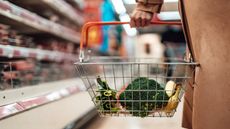UK inflation slows to 10.5%
Figures from the Office for National Statistics showed the decrease was largely due to falling fuel prices


Inflation slowed for the second month in a row in December with the Consumer Prices Index (CPI) coming in at 10.5% over the 12 months to the end of 2022, from 10.7% the month before.
But the figure remains near historic highs as prices continue to be driven up by the high cost of energy, food and non-alcoholic beverages, the latest data from the Office for National Statistics (ONS) showed.
Breaking down the UK inflation figures
According to the ONS, the rate of inflation for housing and household services remained the same at 26.6%, primarily due to the high cost of electricity and gas. Despite the government’s energy price guarantee, the cost of energy for households has jumped significantly over the past two years.
Subscribe to MoneyWeek
Subscribe to MoneyWeek today and get your first six magazine issues absolutely FREE

Sign up to Money Morning
Don't miss the latest investment and personal finances news, market analysis, plus money-saving tips with our free twice-daily newsletter
Don't miss the latest investment and personal finances news, market analysis, plus money-saving tips with our free twice-daily newsletter
Food prices increased 16.9% year-on-year (YoY), compared to 16.5% the month before, their 17th consecutive increase as households. Higher prices for milk, cheese and eggs were mainly responsible for the growth.
At the other end of the spectrum, the falling price of motor fuels helped inflation in this category fall from 7.6% in November (YoY) to 6.9% in December. That’s a notable improvement from earlier in the year. Prices in this category were 15.2% higher YoY in June.
Price growth also moderated in the clothing and footwear, and recreation and culture sectors.
However, price growth in the services sector continued to accelerate. The annual rate of inflation for restaurants and hotels rose to 11.4% from 10.2% the month before.
These figures seem to suggest inflation has peaked in the UK (CPI inflation hit a 40-year high of 11.1% in October), but households remain under significant pressure. The figure is still five times the Bank of England's (BoE’s) 2% target suggesting the central bank is likely to continue increasing interest rates.
“High inflation is a nightmare for family budgets, destroys business investment and leads to strike action, so however tough, we need to stick to our plan to bring it down,” said chancellor of the exchequer Jeremy Hunt.
“While any fall in inflation is welcome, we have a plan to go further and halve inflation this year, reduce debt, and grow the economy - but it is vital that we take the difficult decisions needed and see the plan through.”
What does inflation mean for you?
“The second consecutive monthly fall in inflation will raise hopes that peak inflation is behind us, but there is still a long way to go before inflation reverts to normal levels,” says Myron Jobson, senior personal finance analyst at interactive investor.
“For now, the ‘new normal’ of high inflation and rising interest rates threaten to squeeze household finances further.”
Runaway inflation has prompted the BoE to aggressively increase interest rates. Currently, the central bank’s base rate sits at 3.5% following its ninth consecutive increase mid-December. That’s its highest level since October 2008.
The BoE increased the base rate by 0.5% in December, following a hike of 0.75% in November.
The rate is now predicted to peak at 4.5% – previous estimates placed it at 6% by mid-2023 – and a further increase is expected when the bank next meets on 2 February.
Higher interest rates have had a knock on effect on mortgage rates.
In September, following Kwasi Kwarteng’s mini-budget announcement, they rose to an eye-watering 6.65%.
They have since eased to 5.79% and 5.63% for the average two-year and five-year deals respectively, but the property market is showing signs of a slowdown.
Indeed, most house price indexes have predicted prices will fall throughout 2023. Interest rates will remain high as long as inflation remains high, therefore so will mortgage rates.
“High inflation doesn’t just erode purchasing power, but it grates on personal wealth, with many households using up savings and leaning on credit cards to cover everyday expenses,” says Jobson.
Currently there isn’t a savings account out there offering a rate close to the rate of inflation.
But “this should not deter [savers] from seeking out a new savings deal,” says Rachel Springall, finance expert at Moneyfacts. If you are looking to secure a better rate, we have put together a list of the best deals on savings accounts which we regularly update.
“Interest rates on some of the top fixed deals have dipped since last month, as savings providers moved to adjust their market positions. Savers will need to act swiftly to grab the latest deals, as more movement is expected over the coming weeks.”
While the headline inflation figure is easing, it can “differ from your own personal inflation number, so it is worth keeping tabs on your spending habits,” says Jobson. “It may be easier said than done, but where possible, look for ways to boost your savings and pay down debt.”
Nic studied for a BA in journalism at Cardiff University, and has an MA in magazine journalism from City University. She joined MoneyWeek in 2019.
-
-
 Investment trust discounts hit 2008 levels. Here’s how to profit
Investment trust discounts hit 2008 levels. Here’s how to profitInvestment trust discounts have risen to levels not seen since 2008, here are three trusts looking to buy to profit.
By Rupert Hargreaves Published
-
 A luxury stock to buy at a high street price
A luxury stock to buy at a high street priceInvestors wrongly consider Watches of Switzerland a high-street outlet.
By Dr Matthew Partridge Published
-
 UK wage growth hits a record high
UK wage growth hits a record highStubborn inflation fuels wage growth, hitting a 20-year record high. But unemployment jumps
By Vaishali Varu Published
-
 UK inflation remains at 8.7% ‒ what it means for your money
UK inflation remains at 8.7% ‒ what it means for your moneyInflation was unmoved at 8.7% in the 12 months to May. What does this ‘sticky’ rate of inflation mean for your money?
By John Fitzsimons Published
-
 VICE bankruptcy: how did it happen?
VICE bankruptcy: how did it happen?Was the VICE bankruptcy inevitable? We look into how the once multibillion-dollar came crashing down.
By Jane Lewis Published
-
 Would a food price cap actually work?
Would a food price cap actually work?Analysis The government is discussing plans to cap the prices of essentials. But could this intervention do more harm than good?
By Nicole García Mérida Published
-
 What is Warren Buffett’s net wealth?
What is Warren Buffett’s net wealth?Features Warren Buffett is one of the world’s richest people. But how did he make his money?
By Jacob Wolinsky Last updated
-
 What is Rihanna's net worth?
What is Rihanna's net worth?Features Rihanna became the youngest self-made billionaire in 2022. Here’s how she made her money.
By Jacob Wolinsky Published
-
 UK inflation slides to 8.7% - what does it mean for your money?
UK inflation slides to 8.7% - what does it mean for your money?News Inflation has dropped below 10% for the first time in months, but with food prices at a 45-year high, is this good news and what does it mean for your money?
By Tom Higgins Published
-
 What is Bill Gates's net worth?
What is Bill Gates's net worth?Features Bill Gates is one of the world’s richest people, but how did he make his money?
By Jacob Wolinsky Last updated









